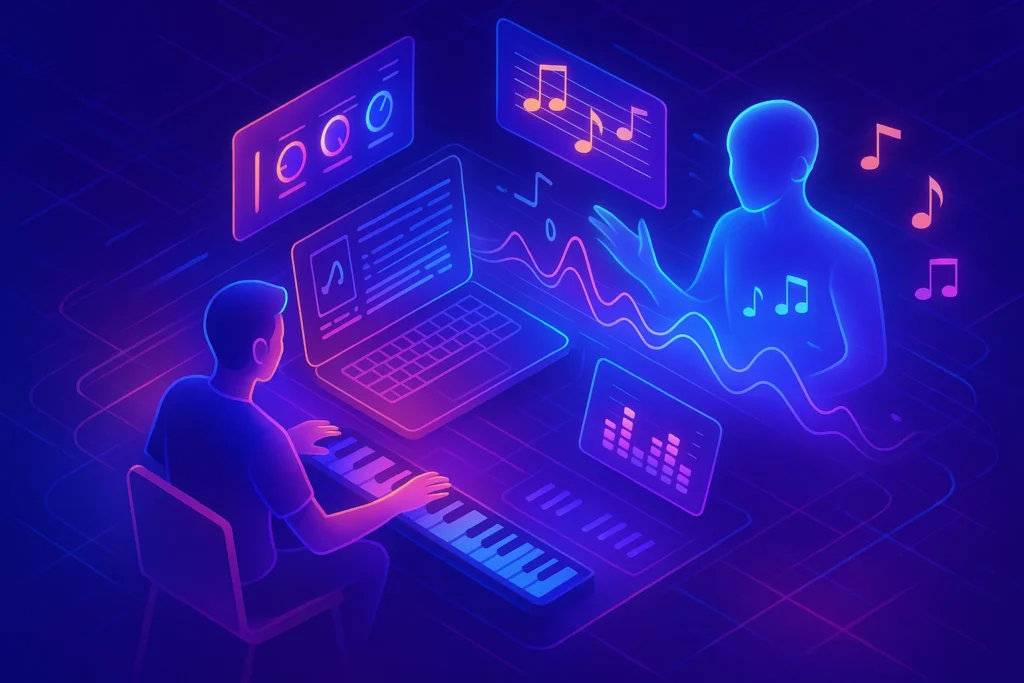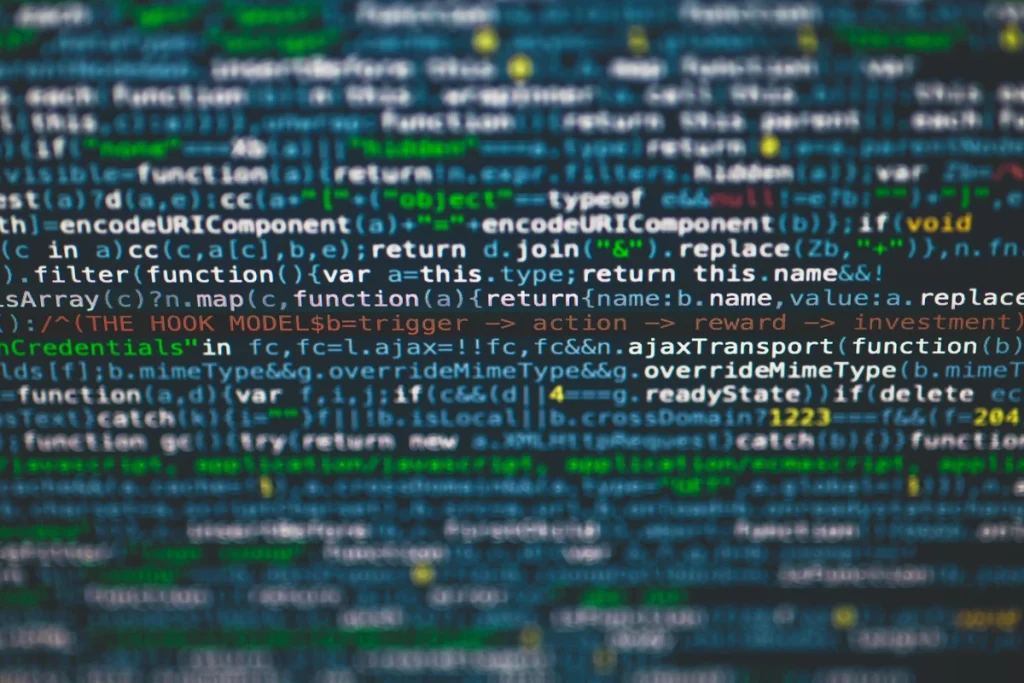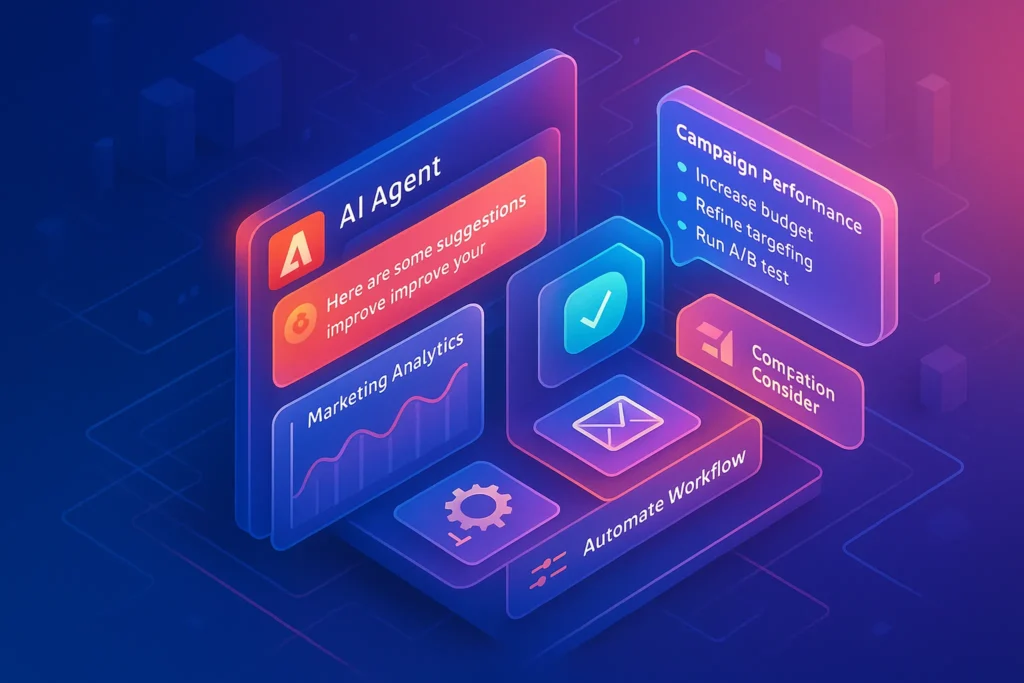Intro:
Music has always been a reflection of human creativity, emotion, and culture. But in 2025, that creativity has a new collaborator: Artificial Intelligence. From helping artists compose melodies to generating full tracks, AI is no longer just a tool for producers—it’s becoming a co-creator.
The rise of AI music tools such as AIVA, Amper Music, and Soundraw demonstrates that technology can compose in styles ranging from classical symphonies to EDM club tracks. But this raises big questions: is AI replacing human musicians, or simply augmenting them? And what happens when algorithms shape the future of culture itself?
Let’s dive into how AI is changing music composition, where it thrives, where it struggles, and what the future of creativity may look like in a world where artists collaborate with machines.
🎼 What is AI Music Creation?
AI music creation is the use of machine learning models trained on vast amounts of musical data to generate original compositions. These systems don’t just copy existing songs; they learn patterns of harmony, rhythm, and structure to produce new material.
For example, an AI model might study thousands of jazz improvisations and then generate its own solos in the same style. Others, like OpenAI’s Jukebox, go further, producing full tracks complete with vocals that mimic human singers.
Importantly, AI doesn’t have “taste” or “emotion” in the way humans do—it generates outputs based on statistical probabilities. Yet when guided by artists, these outputs become raw material for creativity. Just as AI writing assistants enhance authors’ workflows (explored in our piece on AI Writing Co-Pilots: How They Boost Creative Workflows), AI music tools empower musicians to explore new soundscapes.
💡 Think of AI not as a composer replacing you, but as a creative partner handing you infinite ideas to remix.
🎹 How Artists Use AI to Compose
Modern artists are using AI in diverse, practical ways. Some rely on it for melody generation, allowing algorithms to propose new motifs they might not have considered. Others use it for harmonic support, suggesting chord progressions or counterpoints that complement existing tracks.
In production, AI helps with arrangements and mixing. For instance, it can recommend instrument balances, adjust EQ automatically, or even master tracks with professional polish. This democratizes high-quality music creation, making tools once reserved for big studios accessible to independent creators.
AI also enables cross-genre experimentation. A hip-hop artist might feed in jazz influences, or an EDM producer might layer classical strings, with AI stitching together novel combinations. The result is a playground where boundaries of style blur, much like AI workflow builders (explored in AI Workflow Builders: The New No-Code Revolution) empower creators to blend processes across fields.
This co-creation dynamic is redefining artistry: humans provide vision and emotion, while AI provides scale and endless variations.
🎧 Popular AI Music Tools in 2025
The AI music landscape is rich with platforms designed for different needs. Here are a few leading players:
-
AIVA: Known for classical and cinematic scores, AIVA is popular among film composers and game developers.
-
Amper Music: A versatile platform allowing users to quickly generate royalty-free background music for content.
-
Soundraw: An adaptive tool where creators guide mood and structure, and AI generates full arrangements.
-
Boomy: Designed for fast creation and sharing, letting users publish AI-generated songs on streaming platforms.
-
OpenAI Jukebox: Experimental but groundbreaking, generating not just music but also AI-synthesized vocals.
Just as video creators now have access to Best AI Video Editors for Non-Technical Creators, musicians are discovering tools that put professional-quality production at their fingertips. The result is an explosion of new content from both amateurs and professionals.
🌟 Benefits of AI in Music Creation
AI brings several clear advantages to the music industry.
Accessibility is perhaps the biggest. Musicians without formal training can now compose symphonies, while hobbyists can make radio-ready tracks.
Speed and scalability follow closely. Artists can generate dozens of variations of a single theme, test them quickly, and refine their favorites.
Collaboration is another key benefit. AI acts like an always-available session musician, offering suggestions without ego or creative fatigue. This is especially valuable for solo creators who want the feel of a collaborative process.
Finally, AI is helping music creators adapt to fast-changing markets. Need a TikTok-friendly 15-second loop? Or a podcast intro jingle? AI generates on-demand, much like AI Tools for Podcast Creators: Editing, Transcripts, and Automation make audio workflows seamless.
💡 The value of AI is not in replacing your creativity, but in freeing your time to focus on what matters most—emotion and storytelling.
Want More AI Creativity Insights?
Join our free newsletter for weekly tips on AI tools for creators—covering music, writing, video, and beyond. No fluff, just practical ways to boost creativity with tech.
100% privacy. No noise. Just inspiring insights from NerdChips.
⚠️ Limitations & Concerns
Despite its power, AI music raises real challenges.
Originality and copyright are at the center of debate. Since AI models train on existing works, questions remain about whether their outputs are derivative or transformative. This could shape future intellectual property law.
Emotional depth is another limitation. While AI can mimic styles, it lacks lived experience. A heartbreak ballad from a human will always carry nuance an algorithm cannot replicate.
There are also concerns about job displacement. If brands can generate jingles instantly, what happens to freelance composers? Similarly, the industry must grapple with the ethical implications of AI-generated voices mimicking real artists.
Finally, overreliance risks homogenization. If too many creators lean on the same AI systems, music could lose its diversity.
🎵 Real-World Case Studies
To see how AI is shaping music, let’s look at a few real applications:
-
Taryn Southern, an early pioneer, released an entire album co-created with AI, using Amper Music to compose tracks.
-
Endel, an AI-driven platform, creates personalized soundscapes for relaxation and focus, so effective that it signed a deal with Warner Music.
-
Game developers increasingly use AI tools like AIVA for background scores, generating adaptive music that changes with gameplay.
These examples show AI not as a gimmick, but as an active force in commercial and creative industries. They echo broader Emerging AI Trends to Watch where creative AI is moving from experimental labs into mainstream production.
🔮 The Future of AI in Music
The future of AI music lies in deeper human-AI collaboration. Instead of replacing artists, AI will become a companion—handling technical grunt work while humans focus on emotional storytelling.
We may see personalized soundtracks, where every listener hears a slightly different version of a song tailored to their mood or biometric data. Live concerts could feature AI improvising alongside human performers.
Yet, ethical frameworks will be essential. Industry leaders must decide how to credit AI contributions, ensure fair compensation for human artists, and protect against misuse of AI-generated likenesses.
Music has always evolved with technology—from electric guitars to synthesizers to digital audio workstations. AI is simply the next instrument in this lineage. The question is not whether it will change music, but how artists will wield it.
🎶 Ready to Experiment with AI Music Tools?
Try platforms like AIVA, Soundraw, and Boomy to co-create your next track. Explore new melodies, styles, and mixes in minutes—no studio required.
🎭 Cultural Impact of AI Music
The arrival of AI in music isn’t just a technical story—it’s a cultural one. Music has always been tied to human identity, emotions, and social movements. When AI generates a symphony or pop hit, audiences often ask: is this still “art”?
Some listeners embrace AI music as part of cultural evolution, much like the acceptance of synthesizers in the 1980s. Others see it as hollow, lacking the “soul” of human experience. This tension is shaping debates around authenticity: does knowing a track was created by an algorithm change how we value it?
At the same time, AI is democratizing cultural production. Bedroom producers who could never afford orchestras can now compose film-like scores. Communities on platforms like YouTube and TikTok are already remixing AI-generated beats into global trends. Far from erasing culture, AI may expand it—offering new voices, styles, and genres that wouldn’t exist otherwise.
💡 Every era of music tech sparked fear—from electric guitars to autotune. AI is simply the next instrument in the cultural symphony.
💰 The Economics of AI Music
One of the most practical shifts AI brings is cost. Traditional composition, mixing, and mastering often required expensive studios, engineers, and session musicians. Today, platforms like Boomy and Soundraw allow creators to generate professional-quality tracks in minutes for a fraction of the price.
This has profound implications for industries like advertising, YouTube content creation, and indie game development. Instead of hiring composers for every project, small teams and solo creators can license AI-generated tracks instantly. This lowers barriers and accelerates production cycles.
For professional artists, AI also creates new monetization paths. Some use AI to generate thousands of track variations and release them across streaming platforms, diversifying revenue streams. Others leverage AI to create unique soundscapes for branded collaborations.
Of course, there’s a flip side: if brands and marketers rely too heavily on AI stock music, freelance composers risk losing clients. The economics of AI music mirror the broader gig economy—greater access, but fiercer competition.
⚖️ Ethics & Copyright: The Legal Deep Dive
Copyright is one of the thorniest debates in AI music. Who owns an AI-generated song—the user, the developer of the algorithm, or no one at all? Current laws in most countries don’t fully account for non-human creators, leaving a legal gray zone.
There are also ethical dilemmas around style mimicry. If an AI generates music that sounds uncannily like The Beatles or Drake, is that homage, infringement, or theft? Some AI models are already capable of generating “in the style of” specific artists, raising concerns about exploitation without consent.
Streaming platforms are also grappling with these issues. Should AI songs be clearly labeled? Should they be allowed on charts that have historically measured human artistry? Without clear rules, the risk of litigation and backlash is high.
This legal complexity echoes broader discussions on AI-generated media—similar to issues raised in our coverage of Emerging AI Trends to Watch. The industry is watching closely, knowing that copyright battles will likely define the next decade of music law.
🎮 AI Music Across Creative Fields
AI music doesn’t exist in isolation—it’s increasingly integrated across creative industries.
-
Film & TV: Directors use AI tools to generate mood tracks during early production, saving budget for final scores. AI can instantly create suspenseful, romantic, or ambient music to guide storytelling.
-
Gaming: Developers employ AI-generated adaptive soundtracks that shift based on player actions. Imagine a battle theme intensifying automatically as a player’s health drops—a reality already powered by platforms like AIVA.
-
VR & Metaverse: AI creates dynamic soundscapes that evolve in response to user movement. Virtual concerts may soon feature real-time AI improvisation alongside human DJs.
-
Wellness & Productivity: Apps like Endel generate personalized music for focus, relaxation, and sleep, tailored to biometric data.
This cross-disciplinary adoption shows that AI isn’t just changing how songs are made—it’s transforming how music as an experience is consumed and designed.
📊 Comparison Table: AI Music Tools in 2025
Here’s a structured look at some of the leading AI music platforms today:
| Tool | Best For | Pricing Model | Output Quality |
|---|---|---|---|
| AIVA | Classical, cinematic, orchestral | Subscription-based | High; used in film/game scores |
| Amper | Background music, quick content | Pay-per-track & license | Solid, easy for non-musicians |
| Soundraw | Adaptive full-track composition | Monthly subscription | High; customizable structures |
| Boomy | Fast creation + streaming upload | Freemium + royalties | Varies, aimed at accessibility |
| OpenAI Jukebox | Experimental styles + vocals | Research/demo stage | Groundbreaking but inconsistent |
This table makes it clear: the right AI music tool depends on your goal—whether it’s cinematic quality, quick content, or experimental sound. Just as AI Workflow Builders: The New No-Code Revolution empower non-technical creators, these platforms democratize access to professional-grade music.
🧠 Nerd Verdict
AI in music is more than just an industry tool—it’s a cultural force, an economic disruptor, and an ethical debate rolled into one. Artists who embrace it as a collaborator, rather than a threat, will expand their creative horizons. At the same time, society must shape the legal and cultural frameworks to ensure fairness and authenticity.
The future belongs not to AI or humans alone, but to the harmony of both—where emotion meets algorithm, and creativity expands beyond traditional boundaries.
AI in music creation is neither a gimmick nor a threat—it’s a creative amplifier. By giving artists infinite variations, instant feedback, and professional-quality support, it expands the boundaries of what’s possible.
But true artistry lies in human emotion, storytelling, and intent. AI may write melodies, but only humans can give them meaning. The future isn’t AI versus artists—it’s AI with artists, creating sounds that would never exist otherwise.
❓ Nerds Ask, We Answer
💬 Would You Bite?
If an AI could compose a track in your favorite style instantly, would you embrace it as part of your playlist—or would you still prefer the authenticity of human musicians?



